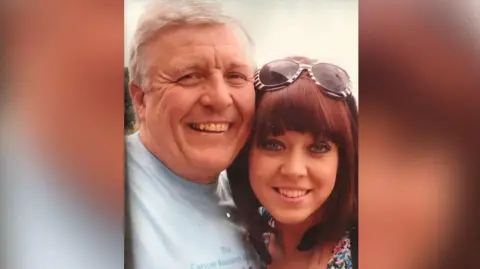Dad says HPV vaccine might have saved daughter
 Family photo
Family photoThe family of a 25-year-old who died from cervical cancer after contracting human papillomavirus in 2012 have urged parents to get their children vaccinated.
Wayne Griffiths, from Talbot Green, Rhondda Cynon Taf, said his daughter Rhian may still be alive had the vaccine been available when she was a child.
HPV is a common group of viruses which can cause cancer and is estimated to infect 8 out of 10 people at some point in their lives, according to Public Health Wales (PHW).
In schools across Wales the HPV vaccine is being offered to all Year 8 pupils and to those who may have previously missed their vaccination.
Mr Griffiths told BBC Radio Wales Breakfast: "It is extremely important for parents and carers to understand the benefits of the HPV vaccine because at the age of 12-13 when it's given, children rely more heavily on advice from parents.
"If you're unsure, don't be, what's stopping you? There's no disadvantages. It could save the life of the child.
"Were this available when Rhian was that age she could quite well be with us now."
HPV vaccines have been available in the UK for girls aged 12-13 since 2008 and to boys of the same age since 2019.
Some HPV-related cancers are more common in men than women, yet despite this, boys are less likely to get their HPV vaccine than girls, according to PHW.
Chris Johnson, head of the vaccine preventable disease programme at PHW, said: "Most HPV infections don't show any symptoms and, for most people, the virus will clear from the body naturally without causing harm.
"However, in some cases it can lead to cell changes that may develop into cancer, or cause genital warts
"High-risk types of HPV are linked to cervical cancer, head and neck cancers, and other cancers of the genitals and anus."
He said the HPV vaccine was "a safe and highly effective single-dose vaccine".
Young people remain eligible to receive the HPV vaccine until their 25th birthday. For boys, the catch up is for those born after 1 September 2006.
